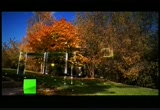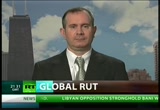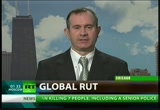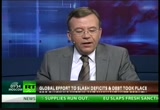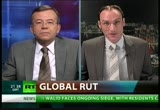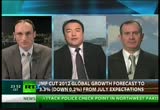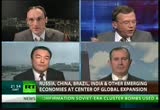tv [untitled] October 15, 2012 5:30pm-6:00pm EDT
5:30 pm
the issue is that so much that there is money coming to the lights is going to really create a game we're calling the global economy risk getting back into recession just three years after pulling out of the previous growth is slowing in your. place. and you can. start. to. flow in welcome across to our bank peter lavelle again we are told the global economy risk getting back into recession just three years after pulling out of the previous one growth is slowing in nearly every major country and political
5:31 pm
uncertainties threaten recoveries in the u.s. and the euro zone have any lessons been learned since the last financial crisis. came. to cross-talk the future of the global economy i'm joined by. in london he is the director of means the whole international and in chicago we cross to chris kudrow he's an adjunct assistant professor at the school of the art institute of chicago all right gentlemen crosstalk rules in effect and that means you can jump anytime you want if we go to london first what do you think about the i.m.f. had to say because i read the language in there real he worried here this is not just a bump in the road this is very serious so for a lot of people in the world the great recession is a political still it's not over it's still going on. no certainly what we're seeing is bounce back from advanced nation to emerging nations and back again to advanced
5:32 pm
nations we're seeing the negativity that was initially merged by the structural problem that was seen in europe which is affected the export conditions of these emerging nations and now it's hurting the advanced nations again on top of we've got the structural problem that's exacerbating as along with the reason problems and many of the situations are songs of protectionism along with a lot of regional dispute for example as you saw in china japan dispute right now so things are getting a lot worse than it was ok chris i mean has anything been learned from the last crisis because you know i'll be a real cynic here the the the richest of the rich recovered very well from this the banks are back on line particularly in the united states ok the euro zone is a different question here but the rich are been saved ok but we see all of these structural problems still out there that have been hardly addressed. well i'm coming from an essentially marxist perspective and so i'm looking at it in terms of
5:33 pm
the freezing of capital meaning the capital investments or not really happening and so there's the question of stimulus versus austerity and i think that a lot of the policy that's in disarray really goes back to the question of the crisis of neo liberalism and monetarism and the perspective that some have a return to a kind of keynesian stimulus an investment strategy i don't think that the prospects for or are very good policing politically are not very good i mean because that's asking people to wait a long time ok politically it's unsustainable to go back to london. well you know that's very true in fact japan has tried that methodology and unfortunately that was taken in a very wrong concept what it ended up with these methodology of course it was executed in a wrong manner because they continued to invest in areas of the very low ball to pliers and what it ended up is as you very well know extremely high dept with
5:34 pm
a deflation of almost two decades now so basically it's almost ironic that we're having the meeting here in tokyo but the fact of the matter is that if we don't execute this then you will have made a lot of burden for the generation of calm and in addition how many countries can actually take that option of taking the methodology i think that is the very question to be asked in this euro zone as well ok i'd like to also bring in martin hannett he's in hong kong he's an associate director at the tike group martin thank you for being with us so do we need a lot more keynes keynesianism keynesianism to fix the global economy on the back of what the i.m.f. has recently said. firstly i would say the i.m.f. doesn't really have much credibility so i wouldn't care whatever they say actually a test or waste of time that's like the same as watching obama and romney would learn anything new as a truth of what's really happening i certainly wouldn't tell you what did i have predicted to personate financial crisis no way and they wouldn't tell you if there
5:35 pm
was a new one so don't rely on that but basically in our view so too there's an age when enterprise was it was never fixed not anywhere nearly to just a penny but always plastered over for riot by putting government money at the problem and now as you have pointed out you know the government debt in all of the major western countries and in japan as well is extremely high and we think there isn't any solution now at this stage because the day is already out of control whether you know you try cutting to reduce the deficit is too late for that too late too late or you know the u.s. fiscal gap is two hundred trillion us dollars that couldn't be fixed discouraging in an hour and on the other hand if you print more money and put out more debt to stimulate that also what were the only two solutions either bankruptcy or debt default on a massive scale in all the major western countries or printing a huge amount of mining. that's called quantitative easing and christopher i can go back to you and only you can ask a really technical question but that's really the risk here is that people want to
5:36 pm
save their wealth inflation is the only thing that's going to save the western world right now to wipe out all of this debt because politically you cannot regenerations to be poor. little depends on who you mean preserving their world. not one of. right and you know the issue there is you know from a broader perspective how to get those people to start investing their money again because they're being tight fisted with it under the present circumstances and so the question is whether austerity will ease you know the credit markets or not and i think that it's interesting that in europe you have such you know division over the question of austerity and you know a country like germany that's in forcing a sturdy it seems to have more of an ideological than practical significance there
5:37 pm
so you know what do you think about that as austerity made things worse i mean i think i'm sure you really greece will agree ok but globally well i would say that it depends on which country you're talking about i mean if one can afford to take that methodology yes that's fine but there are many countries that can fortunately there are quite a few of them i would say in the eurozone then this is a whole structural problem this the whole thing i mean we're getting to i think the core of the problem because there's just so much divided opinions and preferences and priorities between the country we're talking about at least for example japan we just given that is an example it was one country so we could unify consensus whether it was wrong or right but in this case you can't even reach a conclusion and while you're doing that you're just losing valuable time while you're not really making a decisive method be it those stereotypes or being expansion of economy you can't take one sided view and you can't really take the stance and it means that you
5:38 pm
cannot get the full fledged benefit from taking any of the policies that had been the director agreed ok essentially what we just heard there martin is that the tool box is empty they've tried just about everything. you know i mean they're discussing about austerity growth or stimulating growth you know that that's complete nonsense none of this can work because the debt is already totally out of control people need to understand the need to realize that two hundred trillion fiscal gap there is in the way to possibly pay that back and anybody has any idea of economics at all so you know that spain greece italy portugal they are just totally totally utterly hopeless and you know we have just got the news greece the unemployment up to twenty five percent and rising spain downgrade and so on they're just totally hopeless now really as you have been saying to us now it's really a question bit of bail out the top one percent inflation or you know i'm a maybe they let those bangs simply go under and let some of those of the bankers
5:39 pm
disappear and maybe go through some bankruptcy reorganization like glass data type of bankruptcy reorganization where they put some of this casino type gambling parts of the banks out of business and just you know let the banks concentrate on the real lending to productive enterprises of the economy something of this nature you know chris i agree with martin completely but what about the people here it seems like the system has completely failed the people and i'm calling it capitalism it's failing the people. most certainly but the present crisis can be seen as part of a much longer term trend since the one nine hundred seventy s. i think that so jeroen raising the question of japan again points to a kind of deeper historical dynamic at work and you know the question is what regions of the globe could offer the possibility of greater dynamism and growth in the global economy as a whole and i think that you know all things considered. in the last thirty or
5:40 pm
forty years have been a general slowdown not entirely made up for in the one nine hundred ninety s. and so you know i think that a lot of the policy decisions a lot of the controversies about growth have to do with deeper problems that go you know far back if you want to but they seem to think if you go from the one nine hundred seventy jennifer and go back a one line and you know it is the financial ization of the economy that's really it's a significant change over the last few decades as anybody learned their lesson. well i think you know it goes should go back to your initial question if i may because to answer your second question as well the fact of the matter is i think we're all mingling capitalism into one now there is a liberal type of capitalism and on the role type of capitalism and in the past decade or fifteen years what we've been seeing is the liberal type of capitalism that reigns and i'm not going to criticize this totally because when we have
5:41 pm
innovative changes or changes of technology or change the economy when we have that type change they win a lot because their allocation of resources well as their human resources well funds is very quick to pounce on it as you saw in the ip revolutions in the united states but when things do go sour as we're seeing right now the non-liberal type which tend to have much lesser shock of the social phenomenon tend to win out so it just depends on who plays where but the problem was i think that it's not only the academics but it's only the media and also especially the financial arena have resorted to praising this liberal type too much and totally ignored that the tide in tide of times have totally changed and they continue to push with this liberal type and this is the reason why i think stems down to this problem that we're having right now in this arena ok martin we get word from you before we go to the right go ahead but yet. yeah just briefly i also like this show and it doesn't
5:42 pm
really seem to cover it it isn't everywhere as failing asia is doing pretty well i would say you know a number of other emerging market economies are two and here a couple ism is pretty much right and alive is a housing crisis in the us you know very well read but here they're going to as a rule from a maybe because a lot of people are fleeing to singapore and hong kong to escape you know their best these days but it's not only bad really fundamentally the economies i love strongminded don't have all that bad problems as you see in other places and i would also say i want to jump in here will be you know radio news i have a few words emerging world when we get back from that break after a short break we'll continue our discussion on the global economy speak. to you. if you want to. you know sometimes you see a story and it seems so you think you understand it and then you glimpse something
5:43 pm
else you hear or see some other part of it and realize that everything you thought you knew you don't know i'm sorry is a big issue. in the us. more news today violence is once again flared up. these are the images the world has been seeing from the streets of canada. trying to corporations rule the day. i mean so i can only use city in europe on a host of the twenty fourteen which are the figures. seen.
5:44 pm
5:45 pm
5:46 pm
ok martin i got to go back to you in hong kong at the end of the first part of the program humans and something very important about how the emerging market world is reacting to all those i live in russia and it's one of the interesting things has been added on since two thousand and nine ten is that as russia's reform project continues it's always worried about external risks and it's really taking its toll yeah obviously you know russia guy thanks for the a lot to the euro zone so bad that there is certainly a risk and they are doing well at locking more diversifying towards asia and trading more his regime but generally speaking you know we always see things from an investor's perspective as we underestimate advisors and we actually saying that the russian equity market and russian companies are very good while even accounting for those risks of exposed to the euro zone and some things really they will still need even if the economy isn't isn't going necessarily as a natural gas for heating cooking and so on so we think they're actually quite quite some good while you know to be had in russia and as mentioned you know russia
5:47 pm
doesn't have that problem that the western countries have yet the market is already discounted more and a lot of asian economies also when compared with that i was just going to say one last thing on there you know why why people always say all china's even economists and so and so on no freedom and similar to russia but in some ways it's china they're more supportive of businesses in many ways than in the united states where maybe capitalism has made way to some extent to corporatism there's a lot of special interest getting any advantages a lot of more regulations that make business a lot tougher so we generally more positive on what's happening in asia and emerging markets and we should do it in london what do you think about that because we expect the emerging market world to carry the water all the time now. well i do . disagree with that opinion because i do totally agree about the fact about the authoritarianism that is emerging and this corporatism that is emerging in advanced nations and that is hindering
5:48 pm
a lot of opportunities i totally agree with however to deny the formulation of catheters or diversion calculus in the wrong thing to do and to say that you know for example com does a socialist methodology is better i think is going a bit too far in fact far too far consider the fact that what we just aren't doing is to admit the diversions of different types of government style and captive that's involved and as long as you can embrace that and make a flexibility of introducing different types of government style based on different forms of capitalism then it's possible for example japan have been growing the back of that so i do believe that still even though there's a lot of faults if we can at least admit it here to different types of capitalism then i think we still have a way forward certainly much more flexible than having a very heavy country risk for example as we're seeing with the dispute between china and japan you know chris you know i guess everybody likes to use the ism words and you know and i've used it on the on the program capitalism but is competent lism working for the average person in the euro zone. well i don't
5:49 pm
think that it's a question of working in this part of the world or the part of the world exactly i think that one of the trends that we need to pay attention to looking at it from a popular perspective is the question of jobs so for instance you get some of the discussion in the u.s. presidential debate concerning who's going to preserve the jobs who's going to create the jobs in the united states and accusations fly for instance against mitt romney as a job exporter but the jobs are being exported to other countries what that neglects is that the number of jobs also diminish internationally in other words it's not a simple one to one transfer of jobs from the advanced capitalist world to the emerging economies but rather there is the question of an old you know sort of marxist question of wages and capital leaving what's the relationship between wages
5:50 pm
and capital investment and the issue now is how to get capital flowing again such that jobs can be created i think that that's where the real him passes and while certainly different nations different countries will adopt different policies there's still the overall trend in the global economy the elimination of jobs and that creates a problem for the broad masses of people mark if i go back to you i mean you know it's going back to china bashing that everyone likes to do in the united states which i think is really nonsensical you know i mean corporations go to china you know you know that they that they go there to make money ok it's not because that you know nice people or because of its ideology or anything else it's because of labor. yeah and i don't really think that. robots to blame or that it's china to blame for that i mean you know what will be great of robots to all of the rugs and they don't have to work as long as they don't. expand the debt then you know they don't really have that much of
5:51 pm
a problem so it's not really a big problem also if you have a lot of older people in this world like in the u.s. and they're always saying or you have too many people that are going to order the demographic problem but you know if they actually put money aside from them early that they contributed was a pension system and then you know reserve that for those same people to get paid out later it isn't a problem but then what they do though is spend it on some nonsense project all in move was you know bombing some. country for no reason or something like that and then of course you know the surprise surprise the money is gone later on so i think really and in some extent also you just mentioned is capitalism working for europe for the average person there i don't think they have covered it is and i think you know if you're looking at the tax rates that taxing people and taxing corporates to death i think that's more the type of you know nine met style of communism that people will usually tend to associate with communism so i think that's one of the major problems that totally irresponsible leaderships and bureaucrats in the eurozone that really make business they have very very very difficult even now more
5:52 pm
and more for germany as well and so i think germany would be it would be very very valid wise to leave soon and then of course you have also got all these problems that a lot of people don't really seem to want to work very hard you know in the eurozone particularly in the south to do you know you want jump in london. no i just have one question than the fact of the matter is though even when you look at disparity of wealth or the etiology of socialist government or communist government does not realize by these countries in fact is realized by countries like nordic nations or japan which basically is based on liberal type of capitalism where the wealth disparity is a lot narrower than a lot of these countries and longer to view your jobs for example and security educate. all these things are being realized by a country that ate here due to the very good mixture of liberal and particularly in strength england on the real type of capitalism so i think it's very wrong to say that you know all the capitalism have not realized that aetiology in fact these countries have realized that he lived
5:53 pm
a lot more than communist or socialist nations crissy want to jump in and reply to that. well i think you know in terms of decision making process of social resources i think that to conflate you know taxation and regulation with socialism or communism is to avoid the more fundamental issue which is democracy in other words what is the democratic constituency for determining how resources will be allocated how capital be invested what kinds of jobs may i just had to. jump in go ahead. yes i just want to say just on one you know that there's an illusion stands out that there's a big democracy in the united states you just see in their public embody it's a huge waterfall on ron paul for example there's only two major parties they don't even include anybody else in the debate what kind of democracy is that it seems more that there's this corporatism pulling back to puppets on the strings and i
5:54 pm
doubt that really they have this great democracy and freedom there already things in the united states in as much as people are saying that there is this you know it's really there particularly when you compare that was asia by so even a few you know unelected chinese communist on russia but really in reality it's a lot of the key financial interest that pulling strings there in the united states and europe is i would you really call it democracy a very very carefully or cautiously it should you know if i go back to you in london one of the i.m.f. reports where they talked about is the fiscal cliff in the united states and they talk a lot about political risk in the united states is there the political will to address that issue is that the cliff well i think well i think this is a very delicate moment in the united states as well isn't it and what i really fear over here is that america running into the populism type of policies and basically that's exactly what happened in japan in what is happening in japan and look where it's brought a species almost two decades we call it last decade but it's almost to last decade
5:55 pm
so i would say that again it goes back to the very first thing that we were talking about it's very deep difficult at this point to make a decisive position and at this moment i think it's very big i just hope they don't run into the populism type of society in politics ok chris are you optimistic or pessimistic on that point. well of course populism is a problem in other words kind of authoritarian demagogy and you know dividing people nationally against each other so for instance one issue in the united states has been anti immigration. however it's interesting that the parties in this election cycle are steering clear of that so i'm not sure about the question of populism per se to go back to a point those made earlier about liberal versus liberal or authoritarian or
5:56 pm
corporatist forms of capitalism again i think that what this leaves out is the question of democracy and you know that question i don't think is fully addressable by way of populism i think that the old questions of socialism have what a global level i mean what you see in the e.u. for example is the question of whether the e.u. is really constituted as a political body or not in other words what's the status of democracy in the new. you know with respect to differences between countries like germany and greece or germany in the u.k. there is a question of what kind of democracy the e.u. constitutes and therefore what kind of policy what kind of politics is constituted there and i think that that really raises the question of from from my mind of socialism and of you know true democratic accountability we're almost out of time i want to give you the last word here and we're going to know is the world going back
5:57 pm
into recession or the recession getting deeper. well it depends on how much money they print if they print a lot of money we may have a lot of phenomenal growth so we may not see a minus number there on the picture but i'm absolutely not optimistic about the economies of the u.s. and europe relatively more hopeful on asia on russia and a lot of the emerging markets german on that depressing note many thanks to my guest today in hong kong london and in chicago and thanks to our viewers for watching your security see you next time and remember a profitable. me
5:58 pm
24 Views
Uploaded by TV Archive on

 Live Music Archive
Live Music Archive Librivox Free Audio
Librivox Free Audio Metropolitan Museum
Metropolitan Museum Cleveland Museum of Art
Cleveland Museum of Art Internet Arcade
Internet Arcade Console Living Room
Console Living Room Books to Borrow
Books to Borrow Open Library
Open Library TV News
TV News Understanding 9/11
Understanding 9/11